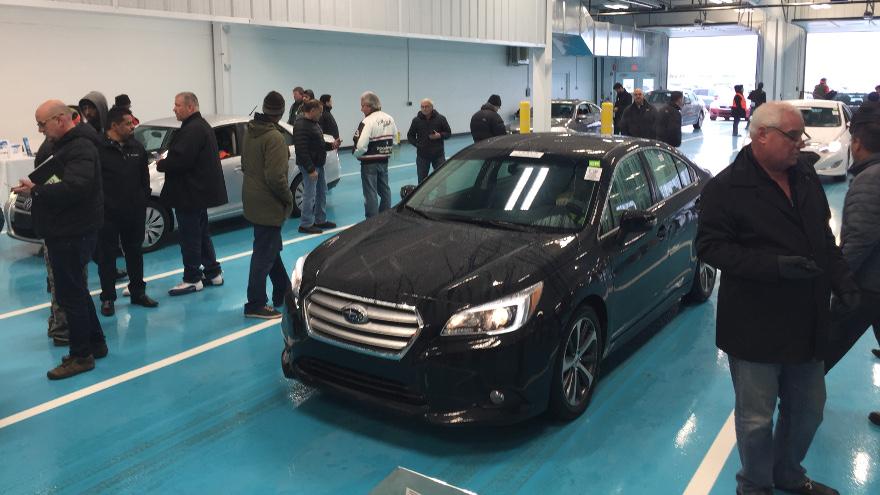Lease returns, acquisitions mean opportunities for ADESA auctions

Action from ADESA Chicago in March 2017. File photo by Joe Overby.
By subscribing, you agree to receive communications from Auto Remarketing and our partners in accordance with our Privacy Policy. We may share your information with select partners and sponsors who may contact you about their products and services. You may unsubscribe at any time.
CARY, N.C. –
KAR Auction Services is pulling in $820 in fees per transaction at its ADESA auction locations.
However, says chief financial officer Eric Loughmiller, only half of that amount is the auction fee.
The rest?
“That’s the value-added services we’re able to drive off of those locations,” Loughmiller said by phone shortly after the company’s latest quarterly earnings call.
“And that number’s growing — probably growing even beyond where we would have predicted it’d be five years ago,” Loughmiller said during the interview, which also included KAR chief executive Jim Hallett. “It’s just that those services are in real demand.”
Those services include things like reconditioning, transportation, dent and paint work, and key-cutting services.
Subscribe to Auto Remarketing to stay informed and stay ahead.
By subscribing, you agree to receive communications from Auto Remarketing and our partners in accordance with our Privacy Policy. We may share your information with select partners and sponsors who may contact you about their products and services. You may unsubscribe at any time.
They represent not only revenue opportunities in the traditional sense of how an auto auction is operated, but a means through which KAR can extend its services to new ventures.
Take, for instance, KAR’s recent purchase of mobility and fleet management software company STRATIM.
Auctions, acquisitions provide opportunity
STRATIM offers “a marketplace of suppliers” to help mobility fleet operators manage their fleets more effectively, KAR chief operating officer and chief strategy officer Don Gottwald said in a phone interview with Auto Remarketing shortly after the February purchase.
So that gives KAR opportunities on the front and back ends of the fleet process.
For instance, some of those could come as the cars are entering the mobility fleets, with things like installing various technologies on the car. And on the back end, it may be removing that technology when the car is de-fleeted and then selling the vehicle.
Other tasks that might include things like cutting keys, fixing dents, sale preparation and shipping — all of which KAR could provide to companies with mobility fleets.
But KAR is not going away from the brick-and-mortar auction fundamentals, either.
“The No. 1 thing is, we’re still going to sell cars in the lane,” Hallett said during the phone interview after company’s latest earnings. “Make no mistake about that. That’s not going away. The second thing, is really being able to expand the breadth of services that we offer.
“When you think of all the reconditioning, the paint and body, the mechanical, the dents, the transportation, the logistics … all those services not only will continue to exist for a certain segment of vehicles of the portfolio, but then we believe there’s an opportunity to expand those services,” Hallett said.
“And then we think there’s an opportunity to bring in new services that we haven’t even talked about yet,” he said. “And there will be a tie-in with STRATIM there, as well, in terms of some of the services that we’ll be able to provide.”
Hallett again emphasized that the brick-and-mortar auction isn’t going anywhere.
“Yes, digital and online will cannibalize some of the physical, but I believe there’s an opportunity to expand the market,” he said. “In expanding the market, one plus one is equaling something more than three.”
Off-lease spike drives demand
Underscoring the demand for ancillary services is the high numbers of off-lease vehicles, which are the biggest vehicle group in terms of use of these amenities, said Hallett.
And when there is as much used-car supply as there is now, sellers are having to set themselves apart from the competition.
Unlike, seven years ago, when buyer demand outweighed supply by so much that cars going through wholesale often weren’t even washed, instead just going straight through the auction to be sold, Hallett said.
“And you’d get $500 more than you got three months ago,” Loughmiller said.
Hallett added: “But where there’s a lot of off-lease cars, oversupplied market, there’s a lot of competition in the lanes. And these dealers and commercial consignors are having to make a decision: How do I differentiate my car in the lanes? Why should someone stand in my lane and bid on my cars versus stand over in my competitor’s lane?
“And oftentimes, the difference is, the amount of money that they’re willing to invest in reconditioning,” Hallett said.
The ancillary services can also be applied to cars that ultimately sell online, Loughmiller said, and reconditioning can actually increase likelihood of sale online
There are some services that KAR provides where the car physically goes to a location, plus other “services that we take to the car” examples of the latter being key cuts, fixing dents and refueling vehicles.
“Bringing STRATIM into the equation here and combining it with what we do at physical auctions, it’s a pretty good strategy for how we can get to cars outside of cars that are just brought to physical auctions or sold at physical auctions … even cars that are sold online, they’re going to need these services,” Hallett said. “And we can eventually get to the online buyer and provide those services.”


